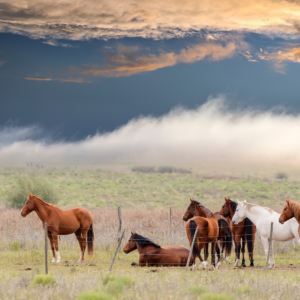 Grazing Behavior in Horses: Monitoring Full-Day Consumption. Research suggests horses graze about 16-18 hours a day if given unrestricted access to pasture. Studies on grazing behavior frequently rely on short periods of observation and data collection. Next, data is extrapolated. Lastly, conclusions are drawn for a complete 24-hour dataset.
Grazing Behavior in Horses: Monitoring Full-Day Consumption. Research suggests horses graze about 16-18 hours a day if given unrestricted access to pasture. Studies on grazing behavior frequently rely on short periods of observation and data collection. Next, data is extrapolated. Lastly, conclusions are drawn for a complete 24-hour dataset.
“Grazing activity varies over the course of the day, and observational studies on nocturnal grazing are clearly limited,” pointed out Catherine Whitehouse, M.S., a Kentucky Equine Research nutrition advisor.
Understanding Grazing:
Knowing when and how often horses graze will improve understanding of the “biological, environmental, and nutritive factors driving grazing behavior in horses.”* In addition, the information could also be used to optimize nutrition and decrease management-related conditions such as gastric ulcers.
To facilitate data collection and ultimately improve understanding of grazing and chewing behaviors in horses, a continuous automated monitoring system called EquiWatch System (EWS), was developed. This remote, automated monitoring unit collects data on feeding and grazing behavior for 24 uninterrupted hours through the use of sensors fixed onto the noseband of the halter. To validate the EWS, the unit was used in horses with unrestricted pasture access and horses offered free-choice hay.
Horses with unrestricted pasture access spent more time eating than horses fed hay (14.8 vs 12.0 hr/d), and horses on pasture had a higher chew rate per minute than when fed hay (84 vs 69 chews/min). Data from the EWS and visual observations for grazing time and total bites were compared. They were similar.
Is your horse plagued with gastric ulcers despite a diet rich in good-quality forage? Even horses with full access to pasture can have gastric ulcers. If ulcers are suspected, consider endoscopy. This will reveal definitively if ulcers are present. If so, a veterinarian will usually prescribe a course of omeprazole. Omeprazole will clear the ulcers. Lastly, at the tail end of omeprazole therapy, a digestive supplement designed to keep new ulcers from forming should be started.
Resources:
In conclusion, do you have a specific question about Grazing Behavior in Horses? Contact J & J Hay Farms today at 770-887-0440!
Article Source: Kentucky Equine Research
*Weinert, J.R., J. Werner, and C.A. Williams. 2020. Validation and implementation of an automated chew sensor-based remote monitoring device as tool for equine grazing research. Journal of Equine Veterinary Science 88:102971.
